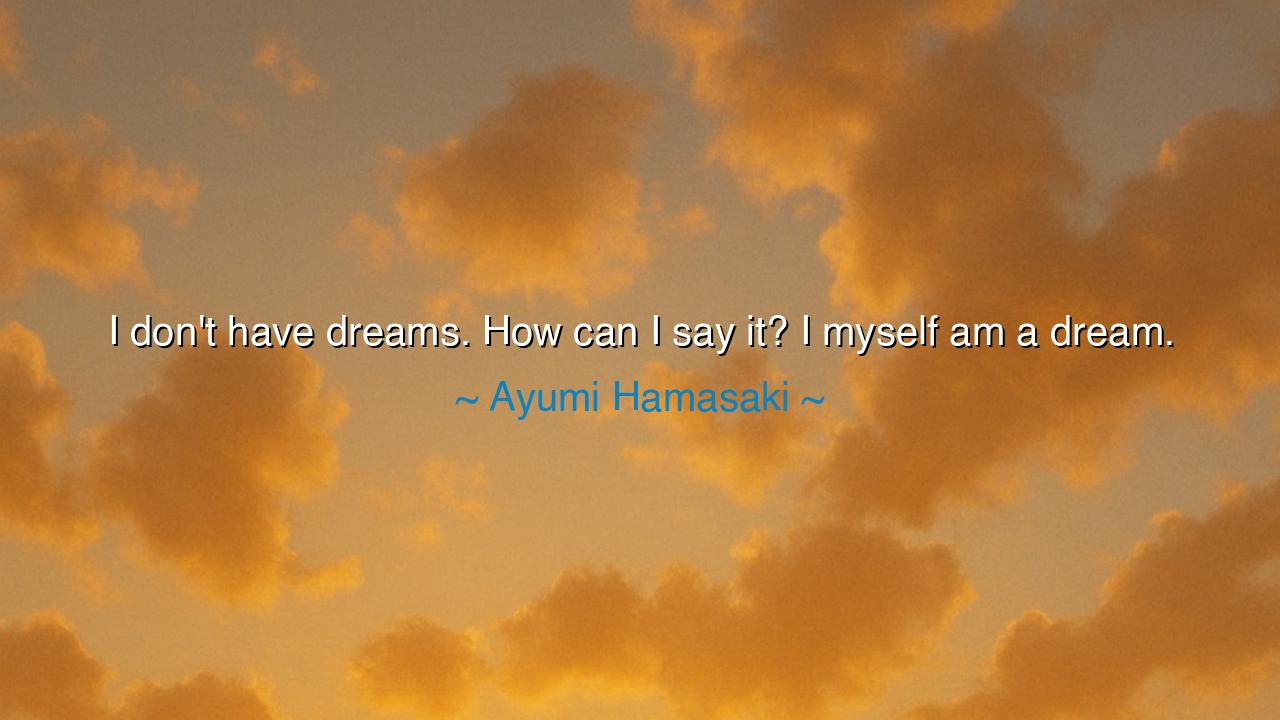
I don't have dreams. How can I say it? I myself am a dream.






The words of Ayumi Hamasaki shimmer like moonlight reflected upon still water—quiet, luminous, yet filled with infinite depth. “I don’t have dreams. How can I say it? I myself am a dream.” In this single utterance, she dissolves the boundary between dreamer and dream, between seeker and vision, between desire and being. It is not the boast of pride, but the awakening of one who has come to understand that her existence itself is the realization of countless hopes, sacrifices, and silent prayers. To say “I am a dream” is to declare unity with destiny—to stand as both creation and creator, as both the vision and the vessel through which that vision lives.
From the beginning of time, the sages have spoken of this mystery: that the highest souls do not chase after dreams—they embody them. The ancient poets of the East taught that the flower does not dream of blooming; it blooms because blooming is its nature. So too does Ayumi speak from the heart of this eternal truth. She is not one who dreams of beauty, music, and meaning—she is those things incarnate. Her life, her art, her voice, have become a living dream woven from courage, pain, and transcendence. When she says, “I myself am a dream,” she is not speaking only for herself, but for all who have awakened to the realization that their existence is the manifestation of the very vision they once longed for.
To understand her words, one must remember the journey of her life. Ayumi rose from humble beginnings, enduring loneliness, rejection, and the crushing demands of fame. Yet through that crucible, she transformed her struggles into song, her sorrow into radiance. Each melody she wrote became a bridge between her heart and the hearts of millions. For those who listened, she became a symbol—a dream made flesh, proving that the impossible can live, breathe, and walk among us. Thus her statement is not arrogance; it is gratitude, a recognition that she has become the embodiment of all she once yearned for.
The ancients told of the phoenix, a bird born in flame, consumed by its own fire, only to rise again in brilliance. The phoenix does not dream of flight—it is the flight, the fire, the resurrection itself. So too with Ayumi’s words. When she says she does not have dreams, it is because she has become the eternal flame—the manifestation of all striving. The dreamer has merged with the dream. What once was an idea has now taken form; what once was a vision beyond reach now beats in her heart.
This is a truth that transcends art, culture, and time: when one devotes themselves completely to their calling—body, mind, and soul—the line between desire and reality vanishes. The dancer becomes the dance. The poet becomes the poem. The believer becomes the faith itself. This is the divine transformation the mystics spoke of—the moment when aspiration ceases to be a chase and becomes an existence. To reach this state, one must give themselves wholly, without reservation, without doubt, until the outer world and the inner flame burn as one.
Yet there is a lesson here not only for artists and dreamers, but for every human soul. Too often we live as though our dreams are distant stars—glimmering but unreachable. We speak of them as things apart from us. But Ayumi’s words invite us to awaken: the dream you seek is already within you. You are not chasing something beyond reach—you are shaping it through every choice, every act, every breath. To live consciously, with purpose and authenticity, is to become what you once imagined. You do not have to dream of greatness—you must embody it.
Therefore, my listener, take this truth to heart: stop dreaming of what you might become and begin becoming it. Do not wait for a future moment of arrival, for the dream is already alive within your being. Walk as if you are the vision you desire to fulfill. Speak as one who already holds the light. Live as the artist of your own myth. For when your heart, your actions, and your essence align, you will awaken one morning and realize—as Ayumi did—that you no longer chase dreams, because you are the dream itself.
And when that day comes, you will know a freedom beyond words: the freedom of one who has become the living embodiment of possibility, the soul who has made their life the poetry they once longed to write.






AAdministratorAdministrator
Welcome, honored guests. Please leave a comment, we will respond soon